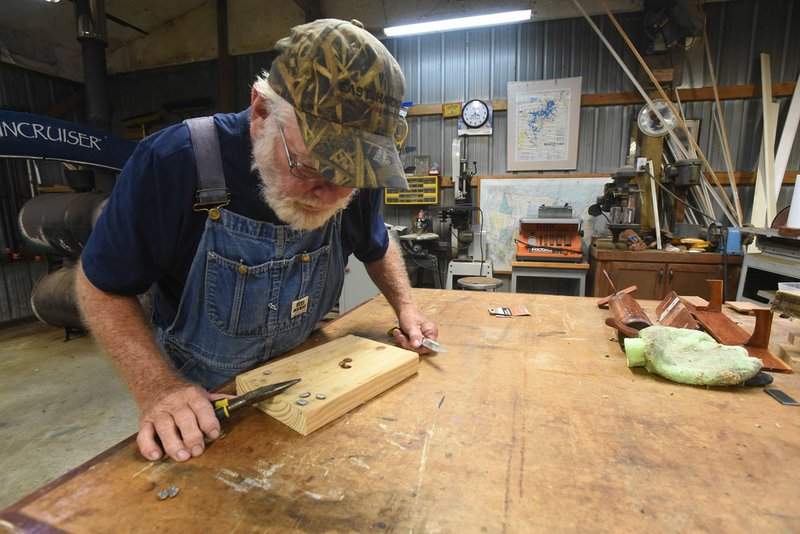We're here on campus at the James Cox School of Jug Fishing where an important scientific experiment is fixing to commence.
With us here in the research wing is James Cox himself, catfisherman extraordinaire and founder of the esteemed school of catching big flathead catfish from Beaver Lake.
The research department is actually Cox's workshop out on the lake east of Rogers. There's not a fish hook in sight because today, professor Cox will tell us what kind of winter we can expect by slicing open a few persimmon seeds.
It's a timely lesson in high science that Cox is happy to teach. That's so any of you readers can gather a passel of persimmon seeds and do your own forecast.
Folklore says that if you slice a persimmon seed open and the pattern inside shows a spoon, there will be plenty of snow to shovel. If it's a fork, it'll be a mild winter with a little fluffy snow. A knife means a frigid winter with wind that'll cut right through you.
For our forecast today, we've collected about 20 persimmon seeds from several locations. Some are from actual persimmons near the Cox school of jug fishing campus. Other seeds were pulled from raccoon scat, so no telling where they're from. That gives us seeds from a wide area.
From the 20 seeds, we'll select six at random for Cox to slice. From the pocket of his bib overalls, Cox whipped out a sharp pocket knife and cut to the chase.
"The most important thing is you don't want to cut your fingers open when you slice the seeds," Cox tutored. So he also whipped out a pair of needle-nose pliers.
With the seed secure in the pliers, he cut it open width-wise. The first seed? A fork. Oh, the drama.
We'll call the next seed an unknown, because it didn't show a pattern, just the meat inside the seed. The next? Drum roll please, a knife.
When the cutting was done, Cox examined the results. One fork, two knives and three unknowns.
So, one might deduce that the winter will be a cold one, because of the knives. There will be a little bit of snow, because of the fork.
Forecasting the winter with persimmon seeds may not be the most reliable way. No matter, Cox does it every fall.
He cut some seeds open last autumn. "They were all spoons," he recalled. But last winter it didn't snow much at all. So Cox doesn't put much truck in what persimmon seeds tell us.
"I'll tell you what it tells me," Cox grinned, "It tells me it's all just an old wive's tale."
I'll second that motion, and also 'fess up that there's really no school of jug fishing, so don't try to enroll online. But if there was a degree for catfishing, Cox would have a doctorate.
He and his fishing buddy, Carey Williams, catch so many catfish that the two host a big fish fry every September at Williams' place. They invite the whole neighborhood, and friends come from all over for the feast.
As far as winter goes, Old Farmer's Almanac may be a more dependable forecast. Northwest Arkansas is right on the line between bitter cold and lots of snow to the north of us, and cold with average precipitation to the south.
Then there's my cat, T.C. Last winter she grew an extra thick winter coat, but the weather wasn't that cold or snowy. This year, her coat looks about average, so maybe we're in for an easy winter.
One thing's for sure. We'll know in a few months what the winter holds in store.
Flip Putthoff can be reached at [email protected]
Sports on 10/16/2018

